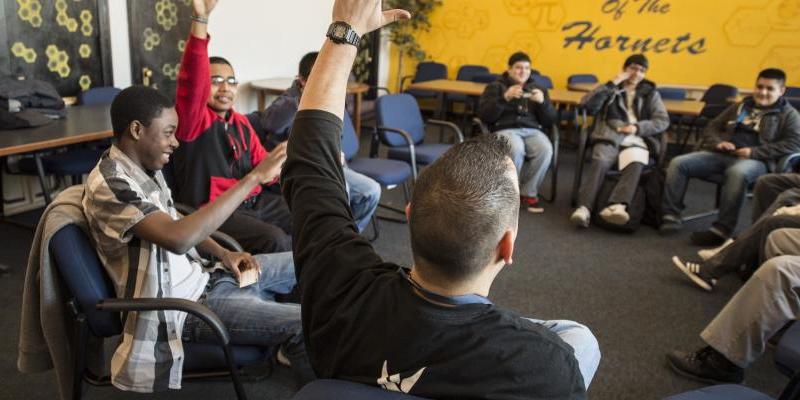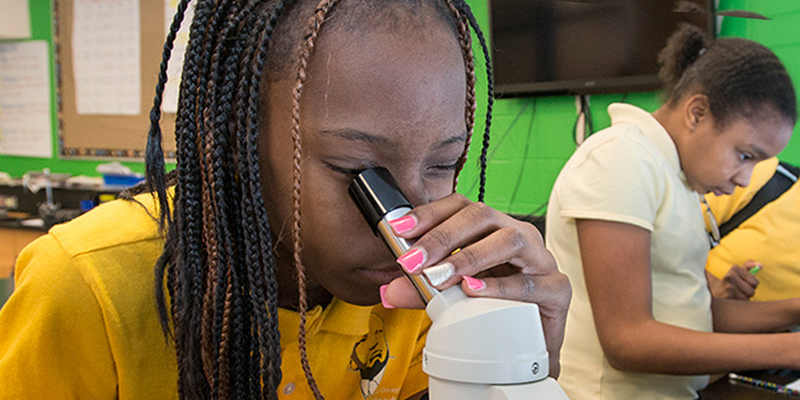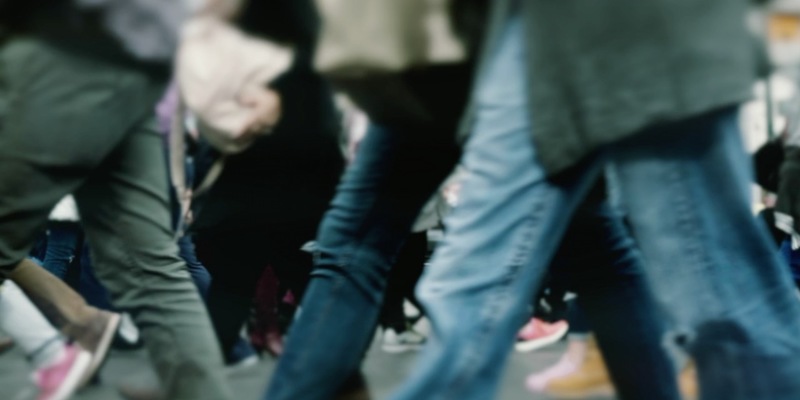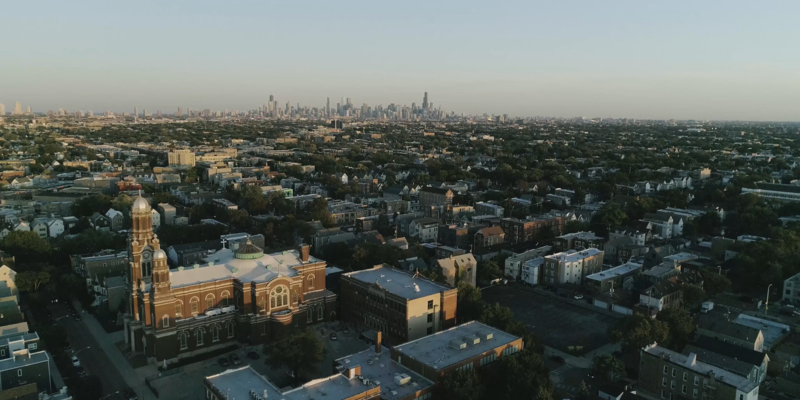Inclusive Economy Lab Nearly One in Seven Chicago Students Experiences Homelessness, According to Study
Report outlines actionable strategies from educators, students and families to maintain student engagement
The UChicago Inclusive Economy Lab (formerly Poverty Lab), housed at the Harris School of Public Policy, has released the results of a comprehensive new study, done in conjunction with Chicago Public Schools (CPS), which finds that 13 percent of students face homelessness during their tenure, with Black students disproportionately affected. Twenty-six percent of Black CPS students experience some form of homelessness, as opposed to four percent of Hispanic students and two percent of white students.
The study, “Known, Valued, Inspired: New Evidence on Student Homelessness in Chicago,” reveals that affected students’ GPAs, attendance rates, and graduation rates lag behind those of their unaffected peers. Seeking to shed new light on the multiple and interconnected dimensions of student homelessness, the report outlines a series of strategies to help students stay engaged in school and succeed.
“Although the impact of homelessness is severe, our report shows that students facing homelessness are resilient and find immense value in school. They are more than capable of reaching their goals with access to supports that address the additional barriers they face,” said Carmelo Barbaro, Executive Director of the Inclusive Economy Lab. “The report highlights actionable strategies that policymakers and educators can implement to help students reach their full potential. This is of heightened importance given the stark racial disparities in students’ likelihood of experiencing homelessness, an obstacle for Black students that is intertwined with other systemic challenges that confront communities of color.”
"Although the impact of homelessness is severe, our report shows that students facing homelessness are resilient and find immense value in school. They are more than capable of reaching their goals with access to supports that address the additional barriers they face."
Carmelo Barbaro, Executive Director, UChicago Inclusive Economy Lab
"The district's population of students in temporary living situations (STLS) has always been a priority for us when looking at where and how to use our resources," said CPS Chief of College and Career Success, Michael Deuser. "Ensuring every school has an STLS liaison, conducting extensive outreach to STLS students and families and connecting them with important supports and community based resources is just some of the work being done on behalf of CPS to support our most vulnerable students. We remain committed to ensuring our STLS population is supported and resourced in a way that helps them succeed in the classroom and beyond and the Lab's report provides important insights that will inform the district's efforts for years to come."
The report’s key findings related to the impact of homelessness on student success include:
- In the first year that they experienced homelessness, elementary school students missed an average of five days of instruction due to absence or enrollment gaps, while high school students missed an average of eight days of instruction.
- In the first year that they experienced homelessness, students also experienced declines in GPA. High school students living in emergency shelter or on the street experienced the largest declines – about a 0.5 point drop in the first year, the equivalent of a drop from an A to a C in one class.
Still, students’ housing trajectories show variation over time, as do their academic outcomes. A significant proportion of students experiencing homelessness do demonstrate resilience in both their attendance and GPA over time. In addition, the report shows that experiencing homelessness can manifest itself in different ways – with a plurality of the cases of homelessness being short-term bouts of housing instability, with students living doubled up with family or friends.
“In many respects, what we find is that there is no single uniform experience of homelessness,” explained Kelly Hallberg, Scientific Director at Inclusive Economy Lab and the report’s lead researcher. “A range of trauma, family unrest, and a lack of economic opportunity go hand-in-hand with housing instability in a way that pervades these students’ lives and undermines their attempts to remain engaged in school.”
The report’s authors point to seven strategies to help support students experiencing homelessness to stay engaged in their schoolwork and achieve success: destigmatizing homelessness; understanding the stories behind their status; monitoring students closely and consistently; focusing on meeting basic needs; connecting students and their families with opportunities to earn some extra income; making schools a “one-stop-shop” for students’ needs; and identifying people who can build trust with the individual students.
“The report, which tells the personal stories of some students, makes clear that while the causes of homelessness are systemic, each story of a person experiencing homelessness is an individual story, with individual needs, and that homelessness does not define students or their futures,” said Shantá R. Robinson, Research Affiliate, Inclusive Economy Lab, and an assistant professor at the Crown Family School of Social Work, Policy, and Practice.
Nationally, the number of students experiencing homelessness has increased substantially, with 1.5 million students experiencing homelessness during the 2017-2018 school year, double the number reported in 2004-2005. And the problem is likely worse today. “Researchers expect that the COVID-19 pandemic has increased the number of families experiencing homelessness, while the advent of e-learning has likely further exacerbated gaps in educational outcomes between stably and unstably housed children,” said Hallberg.
“The findings in this report underscore the important role that schools and their surrounding communities can help play in supporting the wide-ranging barriers that students – especially Black students – experiencing homelessness likely face.”
Shantá R. Robinson, Research Affiliate, Inclusive Economy Lab; Assistant Professor, Crown Family School of Social Work, Policy, and Practice
In response to the growing need, CPS has already significantly expanded supports for its students in temporary living situations in recent years, including adding full-time Student Advocates in schools where more than 75 students experience homelessness, and providing individualized coaching for school liaisons on the seven strategies outlined above.
“The findings in this report underscore the important role that schools and their surrounding communities can help play in supporting the wide-ranging barriers that students – especially Black students – experiencing homelessness likely face,” Robinson added. “These insights serve as a rallying call for all of us to ask how we can help support these young people in achieving their aspirations and academic goals, and to overcome the historic and systemic inequities that drive racial inequality in our society.”
The research was made possible with the assistance of Chicago Public Schools, and with the generous support of the Adelson Family Foundation, Crown Family Philanthropies, the Polk Bros. Foundation, and the University of Chicago Women’s Board.
About the Inclusive Economy Lab:
Founded in 2015, The UChicago Inclusive Economy Lab (formerly Poverty Lab) conducts rigorous studies that expand economic opportunity for communities that have been harmed by discrimination, disinvestment and segregation. The lab partners with policymakers, community-based organizations, and others to identify their most urgent and pressing challenges, co-generate evidence about what works, and translate findings into policy changes that reduce urban poverty and improve people’s lives. One of five Urban Labs based at the Harris School of Public Policy, the Inclusive Economy Lab is led by Pritzker Director Marianne Bertrand, Chris P. Dialynas Distinguished Service Professor of Economics at the Booth School of Business.
About the University of Chicago Harris School of Public Policy:
For more than three decades, the University of Chicago Harris School of Public Policy has been steadfastly committed to advancing policy based on evidence, not ideology. Guided by this exacting perspective, our exceptional community of scholars, students, and more than 4,000 alumni take on the world’s most important problems using the latest tools of social science. Harris Public Policy offers a full range of degree and executive education programs to empower a new generation of data-driven leaders to create a real social impact throughout our global society. This is Harris Public Policy: Social Impact, Down to a Science.
Media Contact:
Billy Morgan, Assistant Director, Communications
wrmorgan@uchicago.edu
773.834.9123





